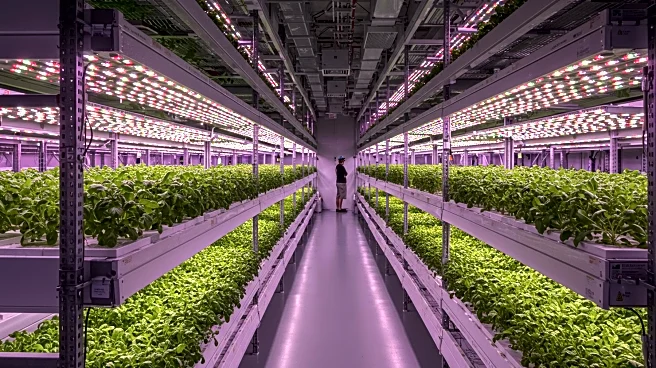What's Happening?
80 Acres Farms and Soli Organic have announced a merger to create a significant player in the U.S. vertical farming industry. The combined entity, operating under the 80 Acres Farms name, will be headquartered in Hamilton, Ohio, and aims to achieve $200 million in revenue within the first year. The merger is set to enhance the supply of salad greens, microgreens, herbs, and tomatoes to major U.S. retailers such as Kroger, Meijer, HEB, and Walmart, as well as convenience stores and foodservice channels. The merger combines 80 Acres Farms' GroLoop technology platform with Soli Organic's agronomic expertise, aiming to optimize environmental control and improve product quality while reducing costs.
Why It's Important?
The merger between 80 Acres Farms and Soli Organic is significant for the vertical farming industry, which has faced challenges in scaling and profitability. By combining resources and expertise, the new entity aims to become one of the largest and most advanced indoor farming networks globally. This development could enhance supply chain resilience and product quality, offering increased customer choice through both vertical farming and field-grown organic products. The merger also highlights the growing importance of indoor agriculture in response to trade volatility and the need for sustainable food production methods.
What's Next?
The newly formed company will focus on integrating 80 Acres Farms' GroLoop technology with Soli Organic's agronomic knowledge to improve operations and expand their product portfolio. The merger is expected to drive innovation in the vertical farming sector, potentially influencing other companies to adopt similar strategies. Stakeholders, including retailers and consumers, may benefit from improved product quality and supply chain reliability. The industry will be watching closely to see if the merger can overcome the financial challenges that have plagued other vertical farming ventures.
Beyond the Headlines
The merger could have broader implications for the agricultural industry, particularly in terms of sustainability and technological advancement. By demonstrating the viability of large-scale vertical farming, the combined entity may encourage further investment and development in this sector. Additionally, the focus on technology and agronomy could lead to new breakthroughs in crop production and environmental management, potentially setting new standards for the industry.









